|
|
|
Sort Order |
|
|
|
Items / Page
|
|
|
|
|
|
|
| Srl | Item |
| 1 |
ID:
163813
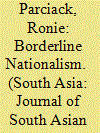

|
|
|
|
|
| Summary/Abstract |
The daily ‘Retreat Ceremony’ held at the Wagah–Attari border between Pakistan and India evokes questions regarding Indo–Pak relations, their public display and the dynamic mix of hostility versus reciprocal collaboration the ceremony demonstrates. Over the past couple of years, the Indian border zone at Attari has undergone major changes affecting both its spatial design and commerce in the local bazaars. Between 2011 and 2015, video compact discs sold there, including some produced by the Indian Border Security Force, expressed a desire to eradicate the India–Pakistan border and unite the two states; these discs disappeared in 2015. However, the Indian desire to see the nation and its borders as partially permeable has not disappeared. This essay addresses the commercial products available at the border-zone area, as well as political changes in India, physical transformations at the Indian border zone, and new practices in the ceremony itself, supporting the idea that the border is an arena that reveals a certain porousness and fragility of the nation.
|
|
|
|
|
|
|
|
|
|
|
|
|
|
|
|
| 2 |
ID:
163819
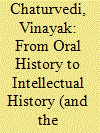

|
|
|
|
|
| Summary/Abstract |
This paper provides an interpretation of the Bengali Intellectuals Oral History Project as a new archive for studying the intellectual history of South Asia. It explains that an important outcome of the nexus between oral history and intellectual history is the construction of an ‘unintended autobiography’ of each subject interviewed in the project. By considering the centrality of autobiography, the paper offers insights into rethinking the methodological approaches to writing the intellectual history of South Asia. Finally, it provides a reading of Partha Chatterjee’s seminal writings, along with his oral history, as a way to consider the convergence of autobiography with political thought.
|
|
|
|
|
|
|
|
|
|
|
|
|
|
|
|
| 3 |
ID:
163815
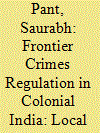

|
|
|
|
|
| Summary/Abstract |
In their pursuit of self-serving goals, sometimes governments create and use various instruments as the means to relatively short-term ends. Such instruments, however, can be tenacious, and have perverse, long-lasting impacts. This paper focuses on one such instrument created during the British Raj: the Frontier Crimes Regulation. Often, the literature on the Regulation focuses on the rationale for its creation from the perspective of the colonisers and refers to the long-term consequences in hindsight, thereby ignoring local voices. However, I show that in 1901, at the time of the drafting of the Regulation, the local colonised population foresaw the potentially lasting pernicious effects stemming from it and voiced their concerns. I demonstrate that these local voices can help us understand the roots of the problems in the Federally Administered Tribal Areas (FATA) of Pakistan today.
|
|
|
|
|
|
|
|
|
|
|
|
|
|
|
|
| 4 |
ID:
163811


|
|
|
|
|
| Summary/Abstract |
In times of heightened, no-longer-linear migratory flows, when migrations oscillate and even double back on their own routes, this article interrogates the unwritten social contract of hospitality between host and guest. Taking as a case study Amit Chaudhuri’s returnee narrative, Calcutta: Two Years in the City (2013)—his personal account of relocation to India—this paper juxtaposes the mismatch between hospitalities assumed and experienced, from India’s lukewarm hospitality to the expectations of its elite (even celebrity) sojourner authors, now diasporic returnee migrants. The article highlights the tensions in negotiating host–guest roles, particularly when insider–outsider, stranger–native boundaries blur. It also raises the question of whether some degree of re-orientalism is therefore inevitable in the cosmopolitan returnee’s perceptions and subsequent representations of what was once ‘home’ and now is ‘home again’.
|
|
|
|
|
|
|
|
|
|
|
|
|
|
|
|
| 5 |
ID:
163820
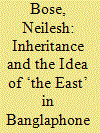

|
|
|
|
|
| Summary/Abstract |
Recent research on intellectual histories of the Global South explore the nature of inheritance and the incorporation of ideas from diverse places into colonial and post-colonial histories. Though research into the histories of science, liberalism and nationalism have multifaceted reference points in the discipline of history, histories of intellectuals in conversation with the history of decolonisation remain a missing link in the history of the twentieth century. Through engagement with the ‘Bengali Intellectuals Oral History Project’ (BIOHP), this paper argues that intellectuals from West Bengal, India, maintained a complex vector of inheritance with Western social thought when contrasted with their East Bengali/Pakistani/Bangladeshi counterparts. The primary interlocutors of eastern Bengali intellectuals were not ‘the West’, but were western Bengal, inside a regional, as opposed to an increasingly global, audience and marketplace of Indian intellectuals.
|
|
|
|
|
|
|
|
|
|
|
|
|
|
|
|
| 6 |
ID:
163812
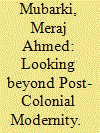

|
|
|
|
|
| Summary/Abstract |
Sanjay Srivastava’s rational, scientific hero, who emerged in the immediate post-colonial Hindi cinema of the 1950s, was strongly linked to the Indian government’s Soviet-style Five-Year Plans. Rigorous town planning and large-scale socio-urban experiments created the conditions for the cosmopolitan, Westernised filmic hero to acquire a hegemonic position within the discursive practices of the Nehruvian state. However, he was by no means the only embodiment of masculinity on offer. Employing narrative analyses of two key Hindi films of the period, I posit that there were competing visions of masculinity, not aligned with, but rather opposed to, the hegemonic discourse of metropolitan culture and cosmopolitan outlook of Nehruvianism.
|
|
|
|
|
|
|
|
|
|
|
|
|
|
|
|
| 7 |
ID:
163814
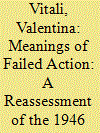

|
|
|
|
|
| Summary/Abstract |
The exhibition, Meanings of Failed Action: Insurrection 1946, opened in Mumbai on 17 March 2017, and then in New Delhi on 8 February 2018. The second part of Vivan Sundaram's ‘The History Project’,1 this new installation was intended to mark seventy years of Indian Independence and Partition by exploring an often forgotten moment of Indian history: the uprising of the Royal Indian Navy's ratings in February 1946, when 10,000 naval ratings took charge of 66 ships across the Indian subcontinent in the name of the ‘Quit India’ movement. The event has since been erased from Indian national history, perhaps because, had the insurrection succeeded, India's struggle for freedom might have taken a different turn. In what follows, I focus on the documents we unearthed while researching for the exhibition—pamphlets, slogans, the ratings’ statements to the police and to the Commission of Enquiry, their memories and prison letters—and examine the motivations and hopes that defined the strikers’ action. What kind of freedom did the ratings stand for?
|
|
|
|
|
|
|
|
|
|
|
|
|
|
|
|
| 8 |
ID:
163817


|
|
|
|
|
| Summary/Abstract |
Over the past ten years, we have developed an extensive oral archive focused on the life histories of Banglaphone intellectuals in the age of decolonisation (1940s–1980s), the Bengali Intellectuals Oral History Project (BIOHP). This special section of South Asia provides an exploration of this online archive, , at the crossroads of oral history, archives of South Asian decolonisation, intellectual history and public histories of the Global South.
|
|
|
|
|
|
|
|
|
|
|
|
|
|
|
|
| 9 |
ID:
163821
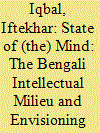

|
|
|
|
|
| Summary/Abstract |
Drawing on a new digital collection of oral interviews, this essay examines the place and meaning of the state in Bengali thought. In the immediate aftermath of decolonisation, East Bengal intellectuals, without substantial pre-engagement with the colonial state, favoured forms of political action or praxis that longed for a new state—a longing that culminated in the birth of Bangladesh in 1971. Intellectuals connected to West Bengal, already entrenched in their own economic and social multiverse, never entertained the idea of a new state outside India. Instead, a Foucauldian irreverence for the state and its elite became more dominant there, flourishing through Subaltern Studies. Despite these differences perceptible synergies in the Banglaphone thoughtscape took root in the 1980s that spoke to late Cold War anxieties about the future of participatory democracy and the public good. This convergence of thought across Bangladesh and West Bengal reflected the emergence of an intellectual who elided the notional boundaries of the post-colonial state, yet stood ambivalently before the crucible of neo-liberal temporality, exposing the limits of the discursive subject in the late twentieth-century Global South.
|
|
|
|
|
|
|
|
|
|
|
|
|
|
|
|
| 10 |
ID:
163818
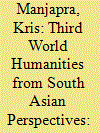

|
|
|
|
|
| Summary/Abstract |
This essay is a thematic and methodological introduction to the Bengali Intellectuals Oral History Project. This interpretive oral history collection reckons with and complicates the over-representation of Bengalis in the study of South Asian intellectual history. As editors, we propose a new framework to study intellectual life in the period of decolonisation—the study of Third World humanities from South Asian perspectives. We situate West Bengal and Bangladesh as important, but obviously not exclusive, vantage points from which to explore formations of Third World thought from the 1940s to the 1980s. Methods in oral history collecting and curation help us to comprehend the intelligibility of Third World humanities expressed from regionally grounded, and diasporically mobile, South Asian perspectives.
|
|
|
|
|
|
|
|
|
|
|
|
|
|
|
|
| 11 |
ID:
163822
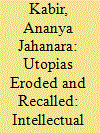

|
|
|
|
|
| Summary/Abstract |
The short-lived geopolitical entity, East Pakistan (1947–71), left a deep impact on its successor state, Bangladesh, through the networks of intellectual kinship it enabled for its young elites who subsequently became Bangladesh’s nation-builders. Drawing on memory studies and literary critical reading methods, I examine the testimonies of nine such elites interviewed by the ‘Bengali Intellectuals Oral History Project’ (BIOHP), alongside their writings published before and after the creation of Bangladesh. This first sustained account of East Pakistan’s intellectual legacy thus also illustrates how a post-colonial intellectual history may be extracted from oral histories as the private and inchoate domain of memory.
|
|
|
|
|
|
|
|
|
|
|
|
|
|
|
|
| 12 |
ID:
163816
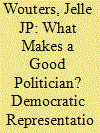

|
|
|
|
|
| Summary/Abstract |
In this article I attempt an ethnography of democratic representation in India by examining how ordinary villagers in the north-eastern state of Nagaland relate to their politicians, what they expect of them, and what yardsticks they adopt to evaluate their performance in office. I focus on the dialectical relationship between homegrown Naga political theory and praxis, and the specificities of Nagaland state and governance to show that the form democratic representation takes there is a reflection of historical particularities and the society’s own conception and normative imagination of its political self and sociality. Provincialising liberalist projections of democratic representation, the article contributes to a promising body of creative analysis that is paving the way for a much fuller and richer understanding of existing democratic life-worlds in South Asia.
|
|
|
|
|
|
|
|
|
|
|
|
|
|
|
|
|
|
|
|
|